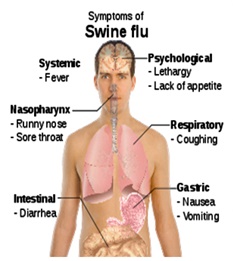What Is Swine Flu?
Swine flu, also known as the H1N1 virus, made headlines in 2009 when it was declared a pandemic. It is still a worry in North India, where cases have been seen every-day. H1N1 has already been seen in 74 countries across the globe.
H1N1 is highly contagious, allowing it to spread quickly from person to person. A simple sneeze may cause thousands of germs to spread through the air. The virus can linger on tables and surface areas like door knobs, waiting to be picked up.
Injection and nasal spray vaccinations are available to prevent swine flu. The best means of dealing with swine flu is to prevent it. Hand sanitization is important to stop the spread of the virus, and staying away from infected people will help stop person-to-person transmission.
Risk Factors for Swine Flu
Swine flu is unusual because it doesn’t target the same age group as the rhinovirus (typical flu). The disease focuses on young adults. This is unusual because most flu viruses attack those who are elderly or very young.
Other risk factors for swine flu include:
- Compromised immune system (from a disease such as AIDS)
- Pregnancy
- Past history of infections
Cause of Swine Flu
The swine flu is caused by a strain of influenza virus that usually only infects pigs. The main transmission isn’t from pigs to people, but rather from person to person.
Swine flu is very contagious. The disease is spread through saliva and mucus particles. People may spread them by:
- Sneezing
- Coughing
- Touching a germ-covered surface and then touching their eyes or nose
Symptoms of Swine Flu
The symptoms of swine flu are very much like those of regular influenza. They include:
- Chills
- Fever
- Coughing
- Sore throat
Diagnosing Swine Flu
A diagnosis is made by sampling fluid from those with swine flu. To take a sample, a doctor or nurse may swab your nose or throat. The swab will be analyzed using various genetic and laboratory techniques to identify the specific type of virus.
Treating Swine Flu
The CDC recommends that healthcare workers in contact with swine flu or suspected swine flu patients take precautions such as:
- Wearing gloves and/or gowns
- Using eye protection
- Wearing face masks
People with known cases of swine flu should be isolated to prevent the spread of H1N1. During the swine flu pandemic, scientists were able to produce a vaccine. The vaccine may be given through an injection or nasal spray. The vaccine is a preventive measure.
Effects of Vaccination:
- Fever
- Aches
- Mild soreness at the injection site
The oral drug oseltamivir (Tamiflu) is the current recommended medication for swine flu. It’s an antiviral drug used to treat influenza infections.
This drug, or sometimes zanamivir (Relenza), is used as treatment for people who have been exposed to swine flu in the last 48 hours, or if they’re suspected of having swine flu. These drugs aren’t used as a preventive measure for swine flu.
Swine flu causes many symptoms that are similar to regular influenza. A diagnosis can be made by testing a swab of mucus from the nose or throat. The oral drug Tamiflu is recommended for those who have swine flu.
Outlook for Swine Flu
Severe cases of swine flu can be fatal. Most fatal cases occur in those with underlying conditions, such as HIV/AIDS.
The majority of people with swine flu recover and can anticipate a normal life expectancy.
- Easy ways to prevent swine flu (in addition to being vaccinated) include:
- Frequently washing hands with soap or hand sanitizer
- Not touching your nose, mouth, or eyes (the virus can survive on telephones, tabletops, etc.)
- Staying home from work or school if you’re ill
- Avoiding large gatherings when swine flu is in season. Flu season shifts from year to year. It usually peaks in January, although it is possible to get the flu any time of year.




